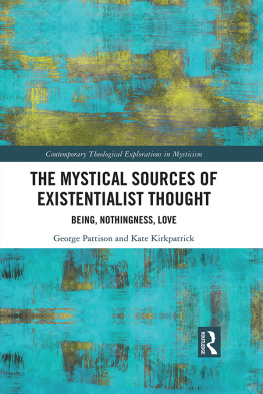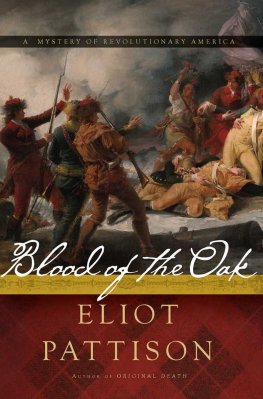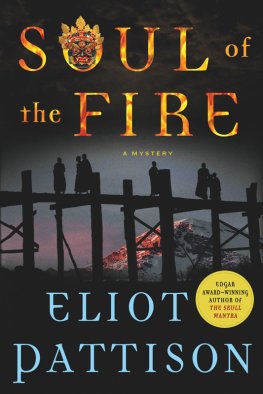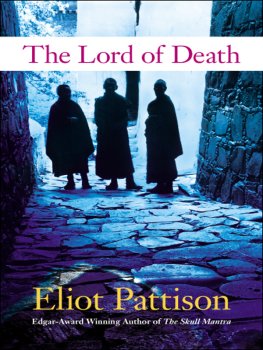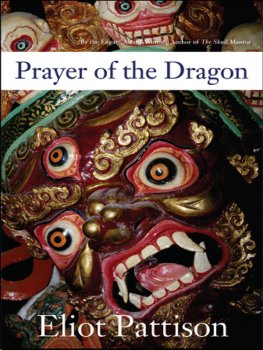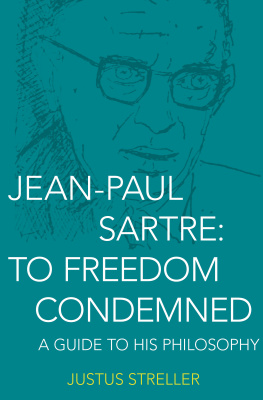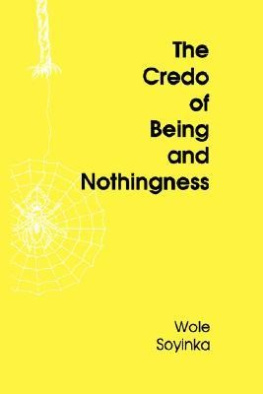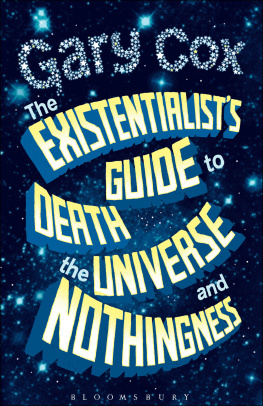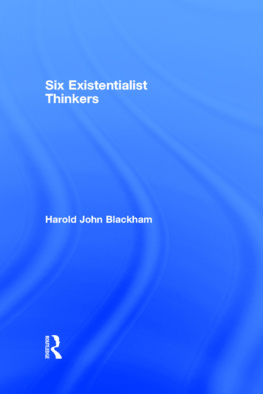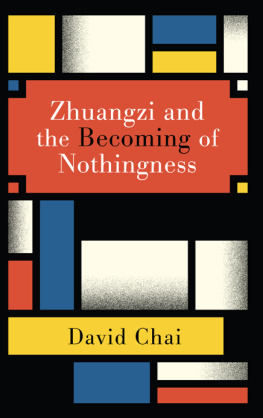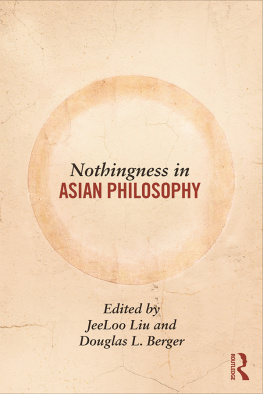George Pattison - The Mystical Sources of Existentialist Thought: Being, Nothingness, Love
Here you can read online George Pattison - The Mystical Sources of Existentialist Thought: Being, Nothingness, Love full text of the book (entire story) in english for free. Download pdf and epub, get meaning, cover and reviews about this ebook. year: 2018, publisher: Taylor & Francis (CAM), genre: Religion. Description of the work, (preface) as well as reviews are available. Best literature library LitArk.com created for fans of good reading and offers a wide selection of genres:
Romance novel
Science fiction
Adventure
Detective
Science
History
Home and family
Prose
Art
Politics
Computer
Non-fiction
Religion
Business
Children
Humor
Choose a favorite category and find really read worthwhile books. Enjoy immersion in the world of imagination, feel the emotions of the characters or learn something new for yourself, make an fascinating discovery.
- Book:The Mystical Sources of Existentialist Thought: Being, Nothingness, Love
- Author:
- Publisher:Taylor & Francis (CAM)
- Genre:
- Year:2018
- Rating:4 / 5
- Favourites:Add to favourites
- Your mark:
- 80
- 1
- 2
- 3
- 4
- 5
The Mystical Sources of Existentialist Thought: Being, Nothingness, Love: summary, description and annotation
We offer to read an annotation, description, summary or preface (depends on what the author of the book "The Mystical Sources of Existentialist Thought: Being, Nothingness, Love" wrote himself). If you haven't found the necessary information about the book — write in the comments, we will try to find it.
George Pattison: author's other books
Who wrote The Mystical Sources of Existentialist Thought: Being, Nothingness, Love? Find out the surname, the name of the author of the book and a list of all author's works by series.
The Mystical Sources of Existentialist Thought: Being, Nothingness, Love — read online for free the complete book (whole text) full work
Below is the text of the book, divided by pages. System saving the place of the last page read, allows you to conveniently read the book "The Mystical Sources of Existentialist Thought: Being, Nothingness, Love" online for free, without having to search again every time where you left off. Put a bookmark, and you can go to the page where you finished reading at any time.
Font size:
Interval:
Bookmark:
This is a book I have long wanted to write. However, I was also aware that to do so would require a more extensive study of French existentialism than I was able to undertake. When I realized that Kate Kirkpatrick was working on just those sources that were missing from my own studies it was obvious what needed to happen and I am therefore grateful to Kate for this collaboration, from which I have learned much. Glasgow University provided the opportunity to give undergraduate teaching on mysticism, and this has been a great help in focusing my thinking in this area. Frances ODonnell and Jessica Suarez facilitated my use of the Paul Tillich Archive at Harvard Divinity School, and I am grateful to them and to the Divinity School for access to this resource. Kevin Smith gave important assistance with references. includes material published in my article The role of mysticism in the formation of Heideggers phenomenology in David Lewin, Simon D. Podmore, and Duane Williams (eds.), Mystical Theology and Continental Philosophy: Interchange in the Wake of God (London: Routledge, 2017), and I am grateful for permission to represent it here. Hilary has lived with existentialism and mysticism for a long time now, and I am appreciative of her interest, her questioning, and her patience. Perhaps there are some good ideas in here!
George Pattison
This is a book I am very glad to have written. So my first thanks are to George Pattison for the invitation to write it, for this collaboration, and for the ongoing conversation of which it is a part. I have learned a great deal through this joint project. I am grateful to the University of Hertfordshire for the opportunity to teach Nietzsche, which helped clarify my thoughts on mysticism, negation, and affirmation in the French reception of Nietzsche, and to the Mystical Theology Network for opportunities to present aspects of this work in progress at their conferences over recent years especially passages on Beauvoir, Sartre, Weil, and Bataille. I am also grateful to Pamela Sue Anderson for her much-missed conversations about Beauvoir, Joan of Arc, and the mysticism of action. Finally, I am grateful to Matt for all of the ways he says yes to life together, not least for his conversations and his patience.
Kate Kirkpatrick
Kierkegaard
We have seen that the development and dissemination of the modern idea of mysticism is intimately bound up with the history of German Idealism in both its Romantic and philosophical forms. Of course, for Kierkegaard, as for other existentialist thinkers, the relation to German Idealism was not a straightforward relation of affiliation but one involving significant contestation. If there is a relationship between Hegelian or Schellingian mysticism and Kierkegaardian mysticism, we can reasonably assume that the differences will be as striking as the similarities. Here, as often, we should not despise the obvious, and we might also reasonably assume that these differences will have to do with Kierkegaards promotion of an individual, passionate kind of subjectivity that dispenses with the need to seek anything like the assured objective knowledge sought by the philosophers as well as with the religious rather than scholarly atmosphere of Kierkegaardian thought.
Kierkegaards own knowledge of sources that could typically be regarded as mystical was quite extensive. His family regularly attended the Pietist meetinghouse in Copenhagen, and Pietism played an important role in sustaining a continuing mystical tradition within Protestantism. For example, Kierkegaards fiance, Regine Olsen (whose family also attended the Pietist meetings), declared Thomas Kempiss The Imitation of Christ to be her favourite reading. Kierkegaard himself tells us that Johann Arndts True Christianity was his daily reading, along with the sermons of J. P. Mynster. This is important because Arndt himself recycled a significant amount of material from older mystical sources, including Eckhart and Tauler.
In 1843 Kierkegaards sometime tutor and lifelong rival H. L. Martensen published a study of Meister Eckhart, including a selection of primary materials that Kierkegaard is likely to have read.
Kierkegaard is often seen as an essentially anti-mystical writer. In Either/Or the fictional Assessor Vilhelm offers a strong criticism of a mystical approach to life, which, as he makes clear, refers specifically to Christian mysticism. Although he speaks of the mystics life as profound and says that the mystic has chosen himself absolutely and has chosen God, his action is internal action. The mystic chooses himself in his perfect isolation; for him the whole world is dead and exterminated, and the wearied soul chooses God or himself.
All this could be read as positive and is in some respects not a travesty of what is said in many mystical writings. However, the Assessors own favoured life-view is what he calls the ethical life-view, which, in his terms, means choosing oneself in the concrete circumstances of ones life in the world and fulfilling ones duty to God by taking up the work and social roles in which one has been placed by divine providence. The mystic may acquire religious or contemplative virtues, but he does not acquire personal virtues.
The Assessors views cannot, of course, be taken as definitive of Kierkegaards own he is, after all, only a fictional character in a pseudonymous work, and many commentators view him as merely a transitional figure toward a more radical kind of religiosity. Certainly his comments flag up a concern that we do meet elsewhere in other pseudonymous works and in works published under Kierkegaards own name. In a similar vein the pseudonym Johannes Climacus warns that the flight to the monastery cannot be a decisive expression of Christian discipleship, whilst a later pseudonym, Anti-Climacus (said by Kierkegaard himself to represent a radically Christian position) insists that the point of Christian discipleship is that it is carried out on weekdays, on the streets, even (he says) in Copenhagens bustling Amager Square. But the concern that the mystic might be seen as exemplifying only a negative freedom or be engaged in a flight from the world does not exclude the possibility of a positive reception of mystical texts, sources, and themes in Kierkegaards own version of Christianity, and this is, indeed, what the texts themselves suggest. So what exactly are the mystical elements in Kierkegaards thought?
The passages that have the most clearly pronounced mystical features are probably not amongst the best-known Kierkegaard proof texts, not least because they are largely from the upbuilding discourses that have for such a long time been the poor relations of Kierkegaard commentary. But they are there, and they are of a kind that would certainly merit the epithet mystical in any standard use of the term.
A common theme of mystical writing is, for example, the annihilation of the ego or self as a condition of union with God, often focused in particular on the annihilation of the will. So, in the discourse entitled Human beings greatest perfection is to know their need of God, Kierkegaard describes how a person who is aroused to concern about their own existence will discover that they are in fact unable to complete the project of self-mastery. Instead, they will find themselves in a situation in which the better self is pitted against another self, the lower self, but, as Kierkegaard notes, no one is stronger than himself, and neither side will be able to prevail over the other. Those who engage in this struggle for self-overcoming therefore find themselves capable of nothing but He who is himself altogether capable of nothing, cannot undertake even the smallest thing without Gods help, that is to say, without being aware that there is a God. Annihilation of the self is thus the negative aspect of a positive experience of God.
Font size:
Interval:
Bookmark:
Similar books «The Mystical Sources of Existentialist Thought: Being, Nothingness, Love»
Look at similar books to The Mystical Sources of Existentialist Thought: Being, Nothingness, Love. We have selected literature similar in name and meaning in the hope of providing readers with more options to find new, interesting, not yet read works.
Discussion, reviews of the book The Mystical Sources of Existentialist Thought: Being, Nothingness, Love and just readers' own opinions. Leave your comments, write what you think about the work, its meaning or the main characters. Specify what exactly you liked and what you didn't like, and why you think so.

